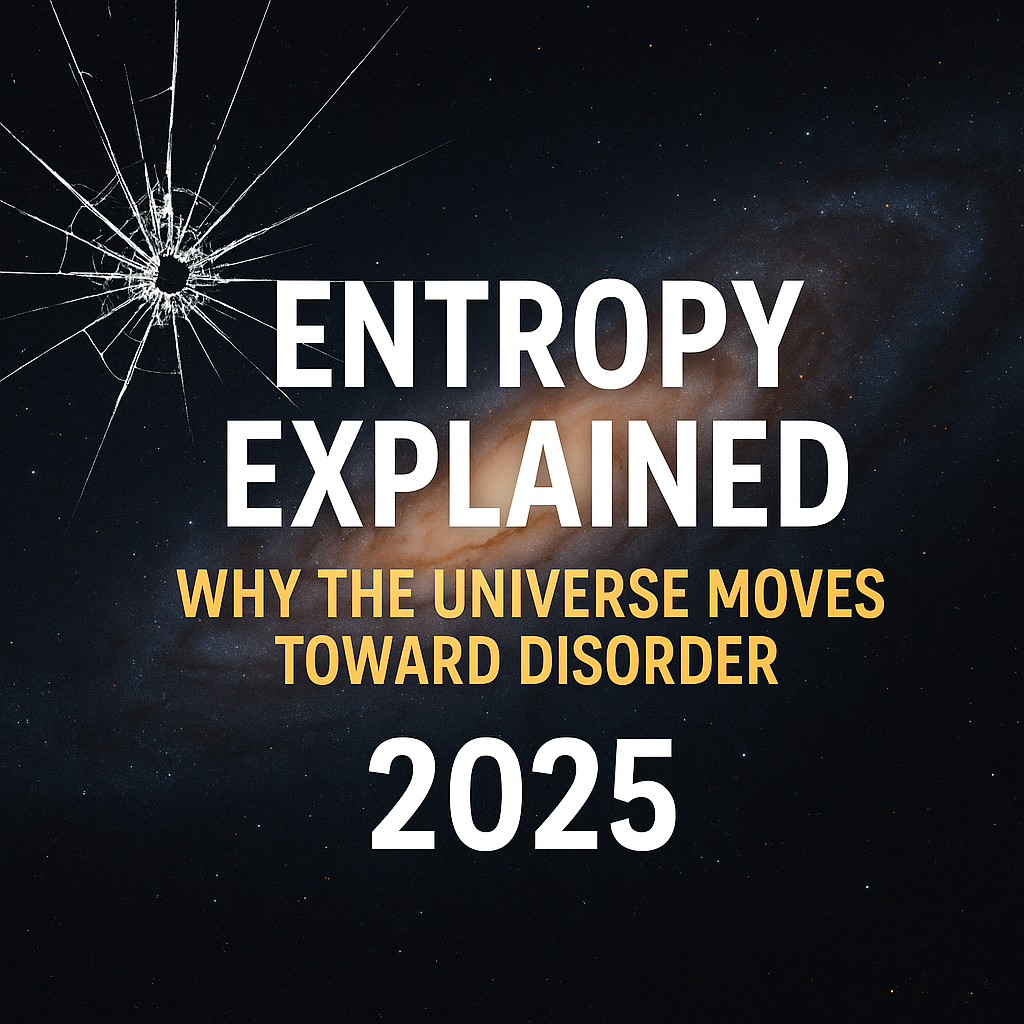Entropy Explained: Why the Universe Moves Toward Disorder

Entropy Explained – Why the Universe Moves Toward Disorder
Entropy Explained: Why the Universe Moves Toward Disorder 🌌
Have you ever wondered why a glass shatters when dropped but never magically puts itself back together? Or why time always flows forward, never backward? The answer lies in one of the most fascinating principles of physics: entropy.
Often described as the “measure of disorder,” entropy is much deeper—it’s the natural tendency of energy to spread out and become less useful over time. This concept explains the arrow of time, the rise of life, and even the fate of the universe.
What Is Entropy Really?
At its heart, entropy isn’t just chaos—it’s about energy distribution. Imagine sunlight hitting Earth. While Earth radiates energy back into space, what truly sustains life here is low entropy energy—concentrated, usable energy from the Sun. That difference powers weather, plants, animals, and human civilization.
The Birth of Entropy: From Steam Engines to Physics Laws
In the 19th century, French physicist Sadi Carnot discovered that steam engines could never be 100% efficient. Some energy always escaped as unusable heat. Later, Rudolph Clausius formalized this into two key laws of thermodynamics:
- Energy cannot be created or destroyed—it only changes form.
- Entropy always increases—energy naturally spreads out, becoming less concentrated and harder to use.
This is why no machine can be perfectly efficient, and why time has a direction.
The Arrow of Time: Why Things Fall Apart
Why does entropy always increase? Think of shuffling a new deck of cards. Ordered sequences are rare, but disordered ones are countless. Overwhelming probability favors disorder. Similarly, in the universe, there are far more ways for energy to spread than to stay concentrated. That’s why time seems to “move forward.”
Life: A Temporary Defiance of Disorder
Surprisingly, life exists because of entropy. Living beings take in low-entropy energy (like food or sunlight) and expel high-entropy waste. In doing so, we actually increase entropy overall, even as we maintain order within ourselves. Some scientists suggest that life itself is nature’s clever way to accelerate entropy.
The Universe’s March Toward Disorder
The early universe started in a state of remarkably low entropy. Gravity clumped matter together into stars and galaxies, raising entropy dramatically. Black holes, in particular, hold enormous amounts of entropy. Over billions of years, the universe is slowly drifting toward a state where energy is so evenly spread out that no work can be done—a scenario known as the heat death of the universe.
Final Thoughts
Entropy isn’t just about broken glasses or messy rooms—it’s the silent law shaping time, life, and cosmic evolution. It explains why order fades, why complexity arises in between, and why the universe itself is on a journey from order to ultimate disorder.
🌍 Want to explore further? Read Entropy and Thermodynamics – Britannica.
📌 Related Read: Sam Altman on GPT-5 and Why 2025 Is the Best Time to Start Your Career
FAQ
Entropy is a measure of how energy spreads out over time. In simple terms, it’s the tendency for systems to move from order to disorder—for example, why an ice cube melts into water instead of freezing itself back again.
Entropy increases because there are far more disordered states than ordered ones. Like shuffling a deck of cards, it’s overwhelmingly likely to end up with disorder. This is why the universe naturally trends toward higher entropy.
Entropy gives time its direction. As entropy increases, events move forward in a way that can’t be reversed. That’s why broken glass doesn’t reassemble and why time feels like it flows in only one direction.
Not exactly. Life creates local order (like building cells and organisms), but it increases entropy overall by consuming low-entropy energy (like food or sunlight) and releasing high-entropy waste.
The heat death is a theoretical state in which entropy reaches its maximum. At that point, energy would be spread so evenly that no useful work could be done—leading to a dark, cold, and inactive universe.
In small, local systems, entropy can temporarily decrease—for example, when ice freezes or when humans build cities. However, this comes at the cost of increasing entropy elsewhere, so the overall entropy of the universe still rises.






